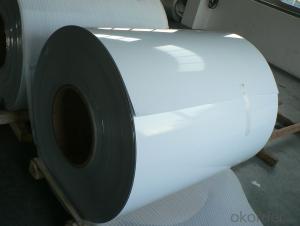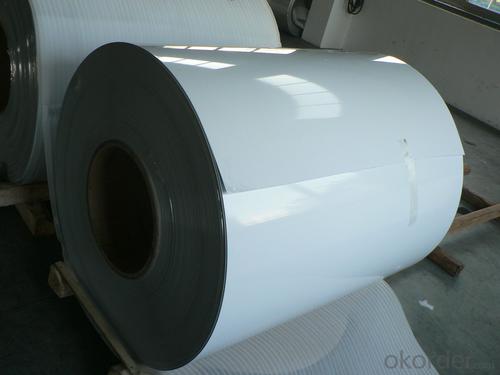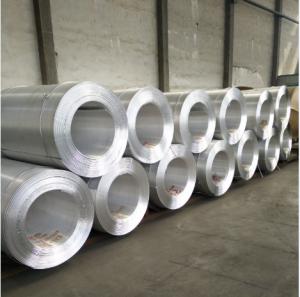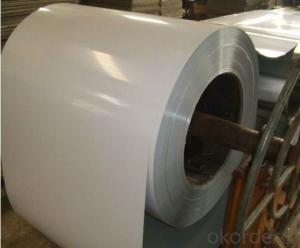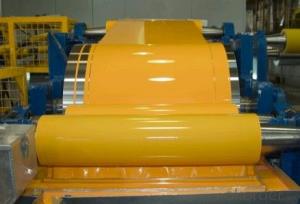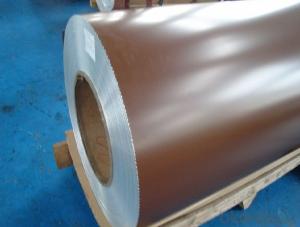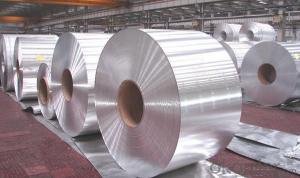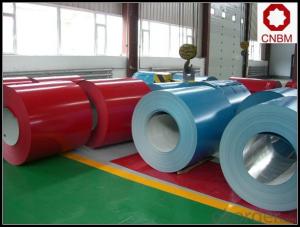Aluminum Coil Epoxy Coated Aluminium Coils 3003 H14 for ACP
- Loading Port:
- Shanghai
- Payment Terms:
- TT OR LC
- Min Order Qty:
- 5 m.t.
- Supply Capability:
- 10000 m.t./month
OKorder Service Pledge
OKorder Financial Service
You Might Also Like
Specification
1. Structure of Coil Coating Aluminium Coils 3003 H14 for ACP Description
• Product: Aluminim coils
• Application:
corrugated roofs, outer walls, ovens, electrically controlled cabinets.
household appliances, transportation, base plate, color coating.
industrial freezers in the residential and industrial buildings.
refrigerator backplane, gas stove, air conditioner, microwave, LCD border.
• Advantage: Full production line with all kinds of coils supply
2. Main Features of the Coil Coating Aluminium Coils 3003 H14 for ACP
• Our goods quality is top, the surface is smooth, and every steel coil
• No Joint, No Bends, no spots, no roller marks.
• MTC will be provided with goods, third part inspection is acceptable, for example, SGS, BV. Etc
3. Coil Coating Aluminium Coils 3003 H14 for ACP Images
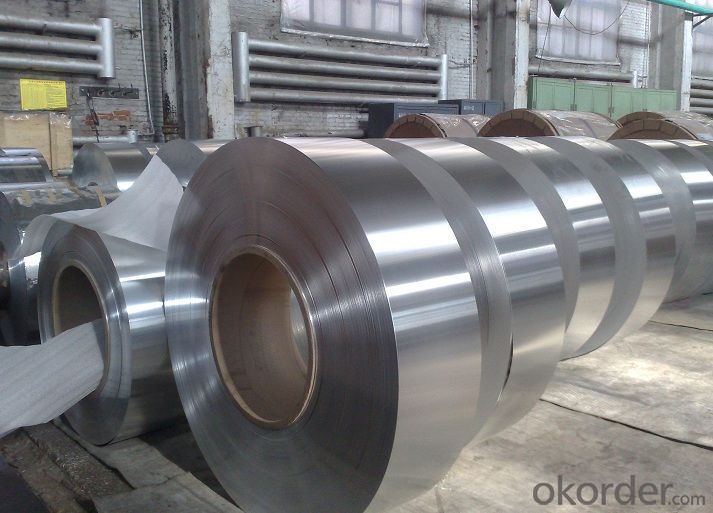
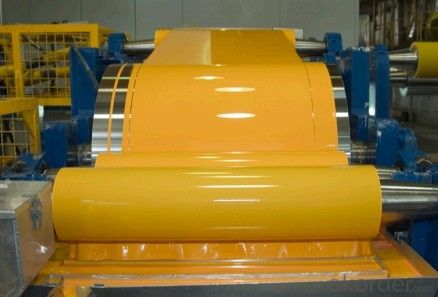
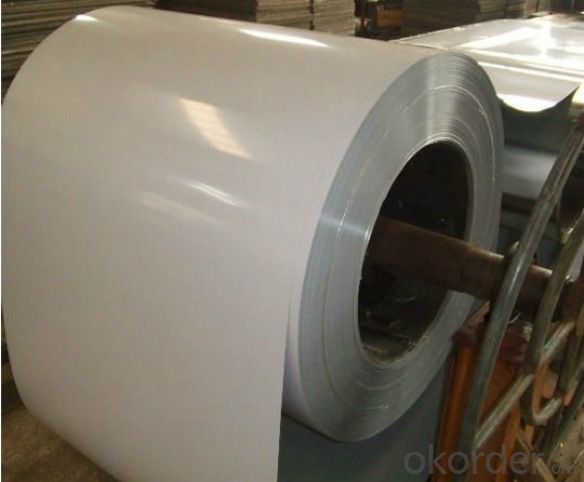
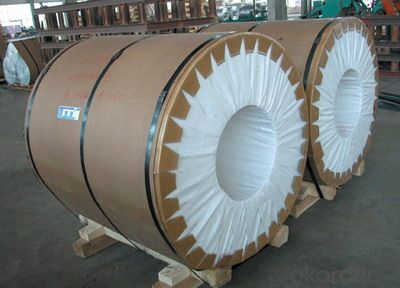
4. Coil Coating Aluminium Coils 3003 H14 for ACP Specification
Alloy | AA1050/1100/3003/3005/3105/5005/5052 etc |
Thickness | 0.03mm—4.0mm |
Width | 10mm—1600mm |
Coating | PVDF, PE |
Coatingthickness | Usually16-25 micron, could be 33-40 micron |
Color | According to Ral |
Standard | ASTM-B 209 GB/3008-2006 |
Usage/ApplicationsCoated Aluminum Coil/Sheet | Constructionand decoration, electronic appliances, lighting decoration, air-condition airpipe, sandwich panels and drainage, etc |
5.FAQ of Coil Coating Aluminium Coils 3003 H14 for ACP
We have organized several common questions for our clients,may help you sincerely:
① How about your company?
A world class manufacturer & supplier of aluminum coil and alloy blanks. Aluminum production base is comprised of 18 aluminum annealers, 10 coil and foil mills, 4 continuous production lines, 2 hot rolling production line and 3 prepainted lines.
Export 5000 tons per month to Asia, America and Middle East. Always do the best for our clients.
②Can you guarantee the quality of the products?
We are responsible for the quality of materials to get a long-term cooperation with clients in a reasonable period of time and we are glad to arrange and coordinate any third party inspection for you.
③What is the delivery time after purchase?
35 day after receiving client’s deposit or correct LC
- Q: What are the different protective coatings available for aluminum coils?
- Some of the different protective coatings available for aluminum coils include polyester, PVDF (polyvinylidene fluoride), epoxy, and acrylic coatings. These coatings help to enhance the durability and resistance of the aluminum against corrosion, UV rays, and harsh weather conditions.
- Q: This question asks for a comparison of various types of equipment used for welding aluminum coils, highlighting their distinct features and applications.
- <p>Aluminum coil welding equipment varies based on technology, power source, and application. TIG (Tungsten Inert Gas) welders are known for high-quality welds and are ideal for thin aluminum coils. MIG (Metal Inert Gas) welders are versatile and suitable for thicker coils, offering faster welding speeds. Stick welders are more portable and cost-effective but produce lower quality welds. Laser welders provide precise, deep penetration welds suitable for high-precision applications. Friction stir welding is a solid-state process that offers excellent joint properties without melting the metal. Each type has its advantages and is chosen based on the specific requirements of the welding task, such as material thickness, weld quality, and production rate.</p>
- Q: What are the recognized standards that dictate the quality of aluminum coil?
- <p>Yes, there are several standards that define the quality of aluminum coil. These include ASTM B209, which specifies requirements for aluminum and aluminum alloy flat sheet, coil, and plate for general usage. ASTM B210 covers aluminum and aluminum alloy sheet and plate for heat-treating. Additionally, EN 485 is a European standard that specifies the requirements for aluminum and aluminum alloy cold-rolled sheets, strips, and plates. These standards outline dimensions, chemical composition, mechanical properties, and other quality aspects to ensure the material meets industry requirements.</p>
- Q: How do aluminum coils contribute to the energy efficiency of products?
- Aluminum coils play a crucial role in enhancing the energy efficiency of various products. Firstly, aluminum is known for its excellent thermal conductivity, which allows for efficient heat transfer. This characteristic enables aluminum coils to quickly and effectively transfer heat between different components within a product, such as in air conditioning systems or refrigerators. By efficiently dissipating heat, aluminum coils help these products operate more efficiently, reducing energy consumption and ultimately saving costs for consumers. Additionally, aluminum is a lightweight material, which makes it easier to incorporate into various products without adding unnecessary weight. This is particularly beneficial for industries such as automotive and aerospace, where reducing weight is essential for improving fuel efficiency. By using aluminum coils in these applications, manufacturers can achieve lighter and more energy-efficient vehicles or aircraft, resulting in reduced fuel consumption and emissions. Furthermore, aluminum coils offer excellent corrosion resistance. This is especially advantageous in products exposed to moisture or harsh environments, as it prevents rust and degradation over time. By maintaining the performance and integrity of the coils, the overall energy efficiency of the product is preserved, ensuring that it operates optimally for an extended period. In conclusion, aluminum coils contribute significantly to the energy efficiency of products through their thermal conductivity, lightweight properties, and corrosion resistance. By effectively transferring heat, reducing weight, and preventing degradation, these coils help products operate more efficiently, resulting in lower energy consumption, cost savings, and reduced environmental impact.
- Q: What does 1060 of the 1060 Aluminum rolls stand for?
- Can aluminium rolls be classified into nine categories? One series is the 1060 series, which represents the 1050106010701000 series aluminum plate, also known as pure aluminum. In all the series, the 1000 series belongs to a series with the largest amount of aluminum.
- Q: Are there any limitations on the bending or forming of aluminum coils?
- The bending or forming of aluminum coils does have limitations. Despite being a relatively malleable metal, aluminum does possess certain constraints in terms of bending or forming. Firstly, one limitation lies in the occurrence of cracks or fractures during the bending process. Unlike other metals, aluminum exhibits lower ductility, making it prone to cracking or breaking under excessive stress or strain. As a result, it is crucial to carefully manage the bending process to prevent over-stressing the aluminum coils and causing damage. Another limitation involves the spring-back effect. When aluminum is bent or formed, it naturally tends to slightly return to its original shape. This poses a challenge in achieving precise and accurate bends or forms, especially with complex shapes or tight tolerances. Moreover, the thickness and grade of the aluminum can impact its bendability. Thicker aluminum coils may necessitate more force or specialized equipment for bending, while different mechanical properties of specific aluminum alloys can influence their formability. To address these limitations, various techniques and tools can be employed. For instance, the use of specialized bending equipment like press brakes or roll forming machines can help control the bending process and minimize the risk of cracking or spring-back. Additionally, preheating the aluminum coils can enhance their ductility, making them more pliable for bending or forming. Considering these limitations and operating within defined parameters is essential for successful bending or forming of aluminum coils. Seeking advice and assistance from experts or manufacturers well-versed in aluminum processing can provide valuable guidance in effectively overcoming these limitations.
- Q: What is the typical yield strength of aluminum coils?
- The typical yield strength of aluminum coils can vary depending on the specific alloy and temper used. However, for many common aluminum alloys, the yield strength typically ranges from 15,000 psi to 40,000 psi (100 MPa to 275 MPa). It is important to note that this is a general range, and there can be variations within different aluminum coil products. Additionally, the yield strength can also be influenced by factors such as the thickness and processing conditions of the coil.
- Q: What are the different surface textures available for aluminum coils?
- There are several different surface textures available for aluminum coils, including smooth, brushed, embossed, and stucco. These textures provide varying levels of aesthetic appeal and functionality, allowing for customization and versatility in various applications.
- Q: What is the cost of aluminum coils compared to other metals?
- The cost of aluminum coils tends to be lower compared to many other metals, such as copper or stainless steel. This is due to the abundance of aluminum resources and the relatively lower production costs. However, it is important to note that the cost may vary depending on factors such as market demand, availability, and specific alloy compositions.
- Q: What are the factors that affect the price of aluminum coils?
- There are several factors that can affect the price of aluminum coils. One of the primary factors is the global supply and demand for aluminum. If there is a shortage of aluminum, the price of aluminum coils is likely to increase. On the other hand, if there is an oversupply of aluminum, the price may decrease. Another factor that can impact the price of aluminum coils is the cost of raw materials. Aluminum is derived from bauxite, and the cost of mining and extracting bauxite can vary depending on factors such as labor costs, energy prices, and government regulations. Any changes in these factors can affect the overall cost of producing aluminum, which in turn can influence the price of aluminum coils. Transportation costs also play a role in determining the price of aluminum coils. Aluminum is often transported over long distances, and the cost of shipping or trucking can vary depending on fuel prices, distance, and other logistical factors. Higher transportation costs can add to the overall price of aluminum coils. Currency exchange rates can also impact the price of aluminum coils. Aluminum is traded on global markets, and changes in exchange rates can affect the cost of importing or exporting aluminum. If the currency in which aluminum is traded strengthens against other currencies, the price of aluminum coils may increase. Lastly, market competition can affect the price of aluminum coils. If there are multiple suppliers of aluminum coils, they may compete with each other to secure customers. This competition can lead to price fluctuations as suppliers try to attract buyers by offering competitive prices. In conclusion, the price of aluminum coils can be influenced by factors such as global supply and demand, the cost of raw materials, transportation costs, currency exchange rates, and market competition. Understanding these factors can help businesses and consumers anticipate and respond to changes in the price of aluminum coils.
Send your message to us
Aluminum Coil Epoxy Coated Aluminium Coils 3003 H14 for ACP
- Loading Port:
- Shanghai
- Payment Terms:
- TT OR LC
- Min Order Qty:
- 5 m.t.
- Supply Capability:
- 10000 m.t./month
OKorder Service Pledge
OKorder Financial Service
Similar products
Hot products
Hot Searches
Related keywords
